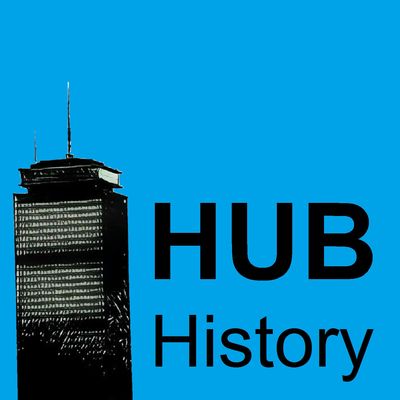Where two history buffs go far beyond the Freedom Trail to share our favorite stories from the history of Boston, the hub of the universe.
http://HUBhistory.com
Boston Goes to Bleeding Kansas (episode 195)
Bloody Kansas was a deadly guerrilla war between so-called Border Ruffians from Missouri in support of slavery on one side, and earnest abolitionists from New England on the other. The violence peaked on Kansas prairies in the decade before the US Civil War officially began, fought with guns, newspapers, artillery, and sometimes even broadswords. A Boston-based company that seeded those earnest abolitionists into that prairie and eventually looked the other way as they transformed themselves from farmers to vigilantes and soldiers.
Please check out the transcript and full show notes at: http://HUBhistory.com/195/
And support the show on Patreon.
Boston Goes to Bleeding Kansas- First annual report of the Massachusetts Emigrant Aid Company.
- First-person accounts of the first and second parties of emigrants.
- Another account of the second party.
- A pamphlet published by the Aid Company in 1854.
- An 1854 letter to Thomas Wentworth Higginson asking for information on the Aid Company.
- Eli Thayer’s 1886 history of the Emigrant Aid Company.
- A 1935 history of the Rise and Fall of the Kansas Aid Movement.
- A 1930 article on the Genesis of the New England Emigrant Aid Company.
- Miss co-host emerita Nikki’s voice? Check out her recent interview on BNNN.
- Our header image shows members of the first party of emigrants, who left Boston on July 17, 1854 and founded Lawrence, Kansas on August 1.
Cloudsplitter is a 1999 a novel by Russell Banks. It’s a sprawling, 750 page epic of historical fiction, telling the story of John Brown and his family through the eyes of his son Owen. A 1998 review of the book said:
The picture that Owen draws of his father is that of a fierce, self-righteous prophet, a man who “did everything with greater intensity than the rest of us,” a patriarch who “took advice badly but gave it without stint,” an absolutist who divides the world into an “us” and a “them.”
The Old Man, we’re told, uses the Bible to justify everything from his domineering control of his family to his preaching the violent overthrow of slavery. He is a tireless proselytizer, a self-deluding dreamer, an Old Testament vigilante, and, it appears, a manic-depressive given to periods of dark brooding and interludes of equally frenetic activity. He willfully imposes his own obsession with slavery on his entire family, and he exhorts his sons to become coldblooded warriors willing to use any means to achieve their ends… Worse, Owen recounts, his father’s embrace of violence as a tool to wage war against slavery had tragic consequences for his children: some of his sons would become heartless killers, some would become martyrs to his cause.
Banks creates a portrait of the Brown family, full of complex resentments between sons and their father. His fictional approach means that he can describe the events at Pottawatomie or Harpers Ferry with a level of grisly, disturbing detail that isn’t available to historians. It’s not an easy book, but it is rewarding, though be aware that the author pretty flagrantly revises the historical facts to support his narrative.
Upcoming Event(s)This Wednesday, July 29, a panel will discuss the impact of Covid-19 and past pandemics on indigeonous peoples in New England. Sponsored by Revolutionary Spaces and the Upstander Project, the panel will consist of the Chairwoman of the Native Land Conservancy, the Executive Director of the Tomaquag Museum, and the Learning Director at the Upstander Project. Two of the three panelists and the moderator are members of New England Native American tribes. Here’s how Revolutionary Spaces describes the event:
From smallpox and measles, to cholera, dysentery, and tuberculosis, Indigenous peoples have suffered disproportionate loss of life from disease since European settlers began to trade with them and later occupy their land. The novel coronavirus has impacted Indigenous peoples with a familiar ferocity, flagging their perennial lack of good jobs, housing, and healthcare. Join a distinguished panel of experts to learn about the historical and present-day conditions that have made Indigenous people especially vulnerable to disease, and the strategies required to break this pattern of discrimination and social violence.
This event is free, but advanced registration is required.
On Tuesday the 28th, the Old North Church historic site is hosting a webinar about the connections between Old North and Boston’s historic maritime culture. On the podcast, we’ve talked about everything from the royal governor who made his fortune by raising sunken treasure to the maritime underground railroad that ran right through Boston Harbor. We’ve even talked about Old North’s maritime tradition in our episode about the so-called pirate tunnels under the North End. Education Manager TJ Todd will focus in on this maritime tradition, as described on the event page:
In almost every way, Boston was a city that relied on the maritime industry. The Old North Church was similarly shaped in many ways by its relationship to the sea. Using the church’s connection to the sea as a launching point, we will examine a narrative that goes beyond the walls of the building: how the sea affected the lives and fortunes of its congregants and even the look of the church itself. Specifically, we’ll dive in to the stories of Captain Samuel Nicholson and Captain Thomas Gruchy in addition to much more.
This event starts at 7pm on Tuesday, and tickets are $15.
